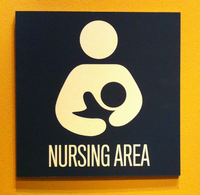
Photo from wikipedia
The objective of this study was to explore what motivates pregnant and breastfeeding women to make changes in their diet, specifically to examine how their perceptions regarding diet facilitate or… Click to show full abstract
The objective of this study was to explore what motivates pregnant and breastfeeding women to make changes in their diet, specifically to examine how their perceptions regarding diet facilitate or act as obstacles to introducing healthy eating habits. For the optimal development of the mother, the fetus, or breastfeeding baby, it is important to avoid foods containing substances, such as persistent toxic substances (PTSs), that are harmful to health during pregnancy and after the baby’s birth. This study used a qualitative research methodology, based on semi-structured individual interviews, food diaries, free lists, and focus groups with 111 pregnant and breastfeeding women in Spain. This approach was followed by a systematic and exhaustive exploitation of the qualitative data obtained, following the methodological principles of grounded theory. From the study results, we conclude that the motivation for a change in diet to avoid PTSs is based on the desire to promote good health, beliefs about the importance of having a varied diet, and the avoidance of potential risks. The main obstacles to change can be attributed to inadequate information, contradictory discourses, and socioeconomic difficulties.
Journal Title: International Journal of Environmental Research and Public Health
Year Published: 2020
Link to full text (if available)
Share on Social Media: Sign Up to like & get
recommendations!